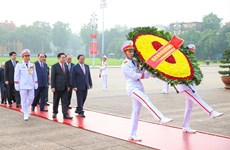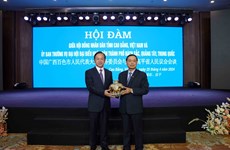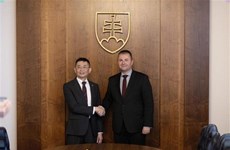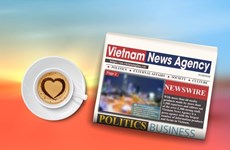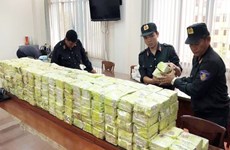Congress debates socio-economic issues
At the plenary session of the 11th National Party Congress on Jan. 13,
delegates debated the country’s development orientation and major
socio-economic issues which were highlighted in documents presented to
the congress.
At the plenary session of the 11th National Party Congress on Jan. 13,
delegates debated the country’s development orientation and major
socio-economic issues which were highlighted in documents presented to
the congress.
Hoang Binh Quan, Party Central Committee member, delegate from Tuyen Quang province delivered his presentation on enhancing and expanding ties with political parties, saying: “Over the past 25 years of doi moi (renewal), particularly during the implementation of Platform 1991, the Communist Party of Vietnam (CPV) has ceaselessly expanded and enhanced diversified relations with political parties from other countries across the world. The Party has participated in international forums, conferences and workshops with other communist parties, workers’ parties and left-winged parties in Asia . We have also extended relations with ruling parties. The CPV has relations with over 200 political parties in 115 countries, of which 100 are communist parties and workers’ parties and 40 are ruling parties. Taking the leading position in our Party’s relations are communist ruling parties from socialist countries and neighbouring nations, including Laos, China, Cambodia, Cuba and the Democratic People’s Republic of Korea.
“Overall, during the 10th tenure, the Party's external relations, along with the State’s foreign affairs and people’s external activities, have made great contributions to the nation’s diplomacy.
“Via Party relations, ties with other countries have been promoted and Vietnam’s standing on the international arena has increased. Via exchanges with political parties, we have gained more international experience in national construction and defence as well as how to resolve socio-economic issues. We have also cemented ties between the country’s top leaders with leading politicians in other countries, creating a common sense and consensus in long-term and stable relations with their countries. They have developed a proper and accurate understanding of Vietnam to the extent that they can involve the country in the making and implementation of their nation’s policies. In some cases, via party ties, we have resolved existing or newly-emerging issues in the relations between Vietnam and other countries.
“However, the external relations activities of the Party need to be more practical in terms of delegation exchanges and more self-motivated in our role at political forums. Improvements should be made in researching and forecasting situations arising in other parties as well as their development trends.”
Delegate Vo Hong Phuc, Party Central Committee member from the Thanh Hoa province delegation made a review of 10 years of implementing the socio-economic development strategy and lessons for the coming decades, stressing that over the past 10 years, Vietnam ’s economic capability has been lifted.
He said: “The country has escaped from poverty and a less-developed status. GDP over that time reached 7.26 percent per year, meeting the strategy’s target. Vietnam has one of the fastest economic growth rates in the world. Last year’s GDP was 101.6 billion USD and GDP per capita was 1,160 USD. We are no longer classed as a low-income developing country. Investment from the whole of society has increased, to around 40.5 percent of GDP. The macroeconomy has remained basically stable and important improvements have been made in infrastructure.
“Urbanisation has risen from 24.2 percent in 2000 to over 30 percent in 2010 and the economic structure has shifted with more focus on industry.
However, growth quality, productivity, efficiency and the competitiveness of the economy is low and macro balances are unstable. Export products are mostly raw materials and industrial goods are mainly manually made. Productivity is much lower than regional economies, for example 2.6 times and 4.3 times lower than China and Thailand respectively. Energy losses are huge. In order to turn out 1 USD of GDP, Vietnam uses about 4.65 times more power than Hong Kong, 2.10 times compared to the Republic of Korea and 1.69 times to Malaysia.
“Infrastructure has developed slowly, with poor quality and a lack of synchrony that has hampered development. The transport network has yet to be completed and we have no express railway, modern sea port or airport. The power supply and network have not met the demands of production or the public.
“The institutions of a market economy have been gradually formed and developed. During 2001-2010, the country has prioritised building a legal system, mechanism and policies. Productivity has been variable across different sectors of the economy, of which the foreign-invested sector has grown strongly, helping to improve the nation’s technology and management standard and competitiveness. However, monopoly in business has not been properly controlled and there remain weaknesses in State macro management.
Meanwhile, delegate Pham Khoi Nguyen, Party Central Committee member from Cao Bang province in his presentation on the environmental protection during the development period, said: “We have made numerous achievements in environmental protection since the implementation of the 10th Party Congress Resolution. They are demonstrated in law building, the formation of environmental police and increased investment in their work. Measures to protect the environment in socio-economic projects have been included and a number of green urban models or green production models and ecological economic models have been developed.
“But it is a truth that environmental quality is getting worse, causing adverse impacts to people’s health and lives. Air, water and soil pollution have been spreading, not only in industrial zones and urban areas but in rural regions too.
“Natural resources have been exploited excessively, resulting in the degradation of water and underground sources and leading to numerous disasters. The reasons are many, but the main one is that too much attention is paid to economic growth rather than environmental protection.
“I want to propose some measures for swift but sustainable development in the future. We need to be more focused on restructuring the economy to be more friendly to the environment and adopt the "green growth" model that has been mentioned in the socio-economic development strategy for 2011-2020. The market economy should be applied to the environment sector to increase the efficiency of State management and raise the sector’s contribution to the national economy. Natural resources and minerals will only become highly profitable to the nation if we have proper plan to exploit and use them. Investment should be encouraged to support industries that use clean technology. Public awareness should be raised on threats to the environment, climate change and rising sea levels. We need to build a strategy to encourage countries and international donors to help Vietnam to resolve environmental matters and support climate change adaptation./.
Hoang Binh Quan, Party Central Committee member, delegate from Tuyen Quang province delivered his presentation on enhancing and expanding ties with political parties, saying: “Over the past 25 years of doi moi (renewal), particularly during the implementation of Platform 1991, the Communist Party of Vietnam (CPV) has ceaselessly expanded and enhanced diversified relations with political parties from other countries across the world. The Party has participated in international forums, conferences and workshops with other communist parties, workers’ parties and left-winged parties in Asia . We have also extended relations with ruling parties. The CPV has relations with over 200 political parties in 115 countries, of which 100 are communist parties and workers’ parties and 40 are ruling parties. Taking the leading position in our Party’s relations are communist ruling parties from socialist countries and neighbouring nations, including Laos, China, Cambodia, Cuba and the Democratic People’s Republic of Korea.
“Overall, during the 10th tenure, the Party's external relations, along with the State’s foreign affairs and people’s external activities, have made great contributions to the nation’s diplomacy.
“Via Party relations, ties with other countries have been promoted and Vietnam’s standing on the international arena has increased. Via exchanges with political parties, we have gained more international experience in national construction and defence as well as how to resolve socio-economic issues. We have also cemented ties between the country’s top leaders with leading politicians in other countries, creating a common sense and consensus in long-term and stable relations with their countries. They have developed a proper and accurate understanding of Vietnam to the extent that they can involve the country in the making and implementation of their nation’s policies. In some cases, via party ties, we have resolved existing or newly-emerging issues in the relations between Vietnam and other countries.
“However, the external relations activities of the Party need to be more practical in terms of delegation exchanges and more self-motivated in our role at political forums. Improvements should be made in researching and forecasting situations arising in other parties as well as their development trends.”
Delegate Vo Hong Phuc, Party Central Committee member from the Thanh Hoa province delegation made a review of 10 years of implementing the socio-economic development strategy and lessons for the coming decades, stressing that over the past 10 years, Vietnam ’s economic capability has been lifted.
He said: “The country has escaped from poverty and a less-developed status. GDP over that time reached 7.26 percent per year, meeting the strategy’s target. Vietnam has one of the fastest economic growth rates in the world. Last year’s GDP was 101.6 billion USD and GDP per capita was 1,160 USD. We are no longer classed as a low-income developing country. Investment from the whole of society has increased, to around 40.5 percent of GDP. The macroeconomy has remained basically stable and important improvements have been made in infrastructure.
“Urbanisation has risen from 24.2 percent in 2000 to over 30 percent in 2010 and the economic structure has shifted with more focus on industry.
However, growth quality, productivity, efficiency and the competitiveness of the economy is low and macro balances are unstable. Export products are mostly raw materials and industrial goods are mainly manually made. Productivity is much lower than regional economies, for example 2.6 times and 4.3 times lower than China and Thailand respectively. Energy losses are huge. In order to turn out 1 USD of GDP, Vietnam uses about 4.65 times more power than Hong Kong, 2.10 times compared to the Republic of Korea and 1.69 times to Malaysia.
“Infrastructure has developed slowly, with poor quality and a lack of synchrony that has hampered development. The transport network has yet to be completed and we have no express railway, modern sea port or airport. The power supply and network have not met the demands of production or the public.
“The institutions of a market economy have been gradually formed and developed. During 2001-2010, the country has prioritised building a legal system, mechanism and policies. Productivity has been variable across different sectors of the economy, of which the foreign-invested sector has grown strongly, helping to improve the nation’s technology and management standard and competitiveness. However, monopoly in business has not been properly controlled and there remain weaknesses in State macro management.
Meanwhile, delegate Pham Khoi Nguyen, Party Central Committee member from Cao Bang province in his presentation on the environmental protection during the development period, said: “We have made numerous achievements in environmental protection since the implementation of the 10th Party Congress Resolution. They are demonstrated in law building, the formation of environmental police and increased investment in their work. Measures to protect the environment in socio-economic projects have been included and a number of green urban models or green production models and ecological economic models have been developed.
“But it is a truth that environmental quality is getting worse, causing adverse impacts to people’s health and lives. Air, water and soil pollution have been spreading, not only in industrial zones and urban areas but in rural regions too.
“Natural resources have been exploited excessively, resulting in the degradation of water and underground sources and leading to numerous disasters. The reasons are many, but the main one is that too much attention is paid to economic growth rather than environmental protection.
“I want to propose some measures for swift but sustainable development in the future. We need to be more focused on restructuring the economy to be more friendly to the environment and adopt the "green growth" model that has been mentioned in the socio-economic development strategy for 2011-2020. The market economy should be applied to the environment sector to increase the efficiency of State management and raise the sector’s contribution to the national economy. Natural resources and minerals will only become highly profitable to the nation if we have proper plan to exploit and use them. Investment should be encouraged to support industries that use clean technology. Public awareness should be raised on threats to the environment, climate change and rising sea levels. We need to build a strategy to encourage countries and international donors to help Vietnam to resolve environmental matters and support climate change adaptation./.









